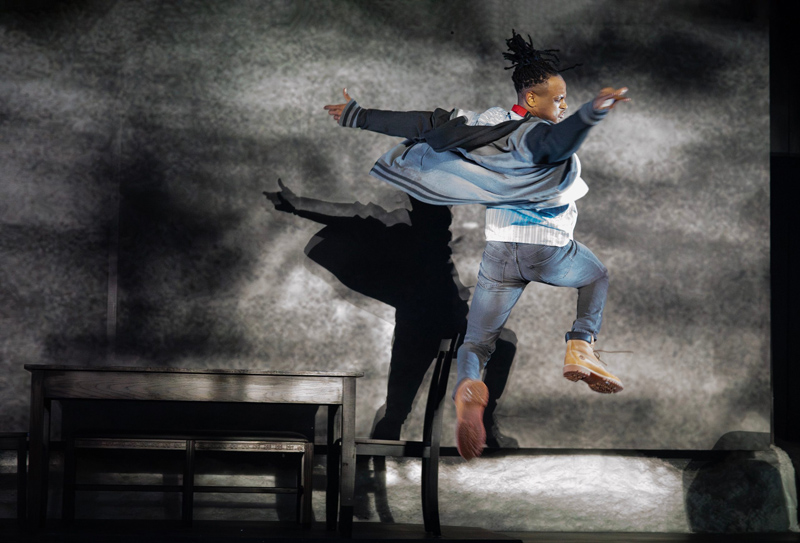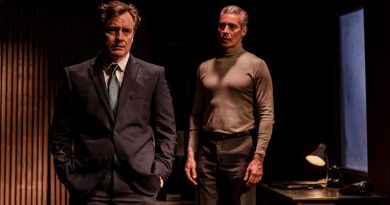“The Salvagers” at Yale Rep
Robert Schneider in New Haven, Connecticut
10 January 2024
It’s comparatively rare that a dramatist hatches a work that neatly fills two hours without forcing, without rushing, and with not a moment that sounds hollow. Rarer still is the knack of easing us into a story gently, giving us a beginning that we can savour, a middle that builds naturally, and an ending that significantly exceeds our expectations. Subjugated by the dramatic edifice, we never see the time go by.

Taylor A. Blackman and Julian Elijah Martinez.
Photo credit: Joan Marcus.
Harrison David Rivers achieves all of this with The Salvagers, commissioned by Yale Rep and appearing there in a distinguished production directed by Mikael Burke.
What appears at first to be a simple story of a father attempting to reach his sullen and despondent son is revealed as a domestic tragedy of weight and substance. It’s easy to pick possible culprits: premature parenthood; the unjust and unnatural compression of generations; the mother’s absence—or the simple cruelty of a Chicago winter. As so often happens, however, the springboard from which the Salvage family backflips into tragedy is a well-meaning lie.
Boseman Salvage Senior and Boseman Salvage Junior share a first and last name and almost an age: they’re only 14 years apart. There’s a mountain of snow outside the apartment they both live in and a wall of frost between them. Boseman Senior (Julian Elijah Martinez) is a locksmith, Boseman Junior an aspiring actor. Rivers fleshes out the son’s character by sliding his audition pieces into the play. We hear the actor, Taylor A. Blackman in a remarkable performance, speak Edmund’s scorn and Hamlet’s despair with special and private meanings, throwing the antique language at his own silence and despair. In contrast, he meets his father’s attempts at conversation with monosyllables. He’s only a bit more talkative with his therapist:
JUNIOR
Nah, it’s not that. It’s just you can only talk about yr own shit for
so long, you know? After a while it’s just… whining essentially. Woe
is me. I’m unhappy. Which is, you know, bullshit basically. Because as
far as I can tell, most people are unhappy. Unhappy is like…
standard.
THERAPIST
How do you feel about that? Unhappiness as the standard?
JUNIOR
I dunno. I guess it’s like, whatever at this point. I mean, if yr only problem is that
yr unhappy and unhappiness is life then you don’t really have a problem.
Junior’s inner monologue only attains full expression in movement; shoveling snow becomes a dance, a workout with his father becomes a duel of competing chin-ups. (Both actors are extremely fit; they perform dozens of chin-ups on stage at top speed.)
Father and son each meet a woman who will ease his pain in scenes that interlace like fingers. Senior comes to the aid of Elinor (McKenzie Chinn), a substitute teacher locked out of her apartment. Junior connects with Paulina (Mikayla LaShae Bartholomew), a waitress at the restaurant where they both work.
The fifth character is Nedra, Senior’s estranged wife and Junior’s mother played by Toni Martin (who also makes uncredited appearances as the therapist and a director at one of Junior’s auditions). Junior clings to his mother like a drowning man clutching a bit of flotsam, never questioning if her apparent buoyancy is real.

Taylor A. Blackman.
Photo credit: Joan Marcus.
Rivers spreads small details like a thin layer of mortar destined to receive substantial blocks of hard fact. Gradually, he assembles it into a towering wall. When the action spills over into telephone calls, as in contemporary plays it so often must, we see the person on the other end of the line in video projections designed by John Horzen, a welcome change from hearing one half of the conversation and intuiting the other, a technique that realistic theatre has dragged with it since the days when telephones had cranks. The projections complete a spare, unfussy-yet-elegant production design in grays and blues with an occasional splotch of red: B Entsminger, set; Risa Ano, costumes, Nic Vincent, lighting. Sound designer Stan Mathabane gets the racket of the Chicago “L” exactly right.
In one of the aforementioned phone calls, Paulina unwittingly insults Junior. She explains what happens to Senior in a mixture of a halting and fluid language. The author explains that the line breaks in the text are for rhythm, not poetic effect:
And obviously I didn’t mean to upset him or anything, but…
He kind of like
Ghosted me?
Like he hung up
And I’ve been calling back, but he…
And normally it wouldn’t be a big deal
I mean, normally I’d be like ‘fuck him’
But, um
I like him
I guess
And I couldn’t stop thinking about his silence or whatever
And thinking led to worry
And worry led me to smoke like a pack and a half of cigarettes
Which is a lot
Even for me.
And then my stomach started to hurt
So I left work
And I came here.
But he’s not home so…
Thanks anyway.
In the final analysis, Boseman Senior is a locksmith of the heart. Boseman Junior is an actor yearning for an existence that isn’t Shakespearian. The women who save them are real, but they have that task uppermost in mind.
I suppose I should mention somewhere that the playwright and his characters are Black, but blackness is refreshingly un-central to their existence. They’re not defined by the struggle against racism or economic oppression; their problems and goals might be anybody’s: to heal, to move forward, to stay together as a family.
In an interview, Rivers says of The Salvagers, “They try to see and be seen, to hear and be heard. It’s awkward and messy and dangerous and hard, but worth it. Ultimately, all the fuss and worry and drama is worth it, which I would assert, is usually the case. Nine times out of ten, people are worth it… Love is worth the effort and—in the end—The Salvagers is a love story.”









